
What began as a colonial project in October 1948 as the University College of the West Indies (UCWI) took only 14 years to morph into the post-colonial, paradigm shift we know today as The University of the West Indies (UWI). With five campuses in Antigua, Barbados, Jamaica, Trinidad and a satellite campus, after 75 years in existence, The UWI has a long history of uniting the Caribbean.
“It has become a cliché, but some clichés are true. The University has been a tremendous unifying force in the region,” noted Emerita Professor of History Bridget Brereton.
“The Federation collapsed in 1952. CARICOM hasn’t on the whole lived up to all the great expectations for it, but UWI has always been a huge unifying force, and you see that on so many levels. For example, when heads of government get together, it's amazing how many of them are UWI graduates, and may have known each other. The example would equally be the thousands of friendships, marriages, and cross-island families created as a result of UWI.”
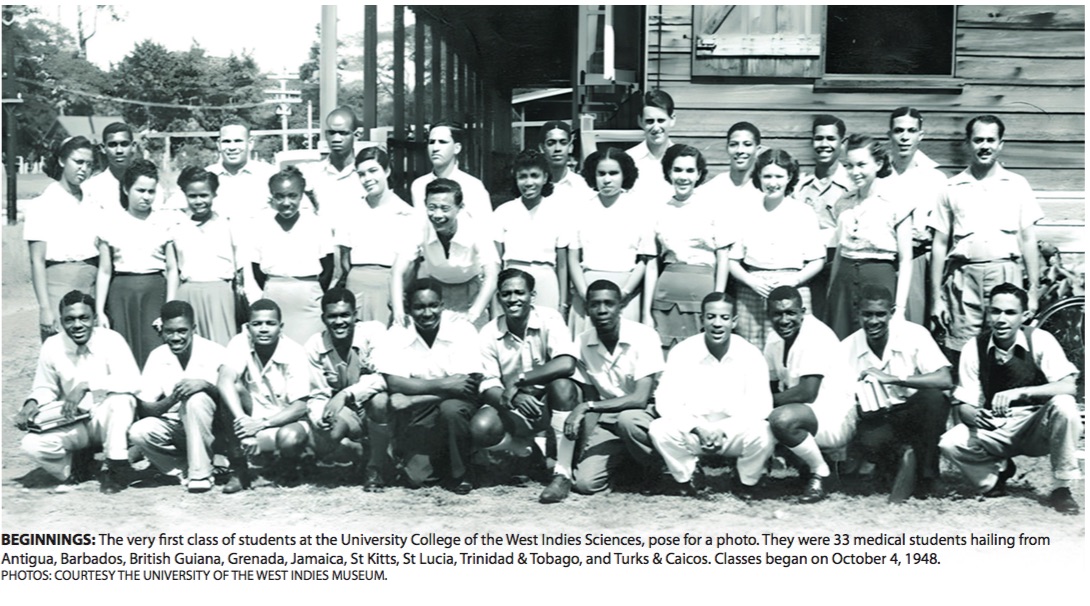
In 1945, at the end of World War II, the government of the United Kingdom convened the Commission on Higher Education in the Colonies. The Commission’s West Indian arm was the Irvine Committee, led by Sir James Irvine of St Andrews University in Scotland, whose mission was to consider how tertiary education in the Caribbean should be guided, and to facilitate collaboration with established British institutions. Their recommendation was for a single, regional campus in Jamaica, open to both men and women, amidst the growing debates around and drive towards trade unionism, nationalism, and adult suffrage.
According to Prof Brereton, there were two factors leading to the founding of UCWI:
“The first factor was internal to the British colonial Caribbean and this was the rise of nationalism. All over the Anglophone Caribbean, the emergence of organisations and groups of people who we could loosely describe as progressive nationalist — that is they were interested in ending colonialism. They were interested in an orderly movement of the different colonies towards self-government, and eventually, independence.
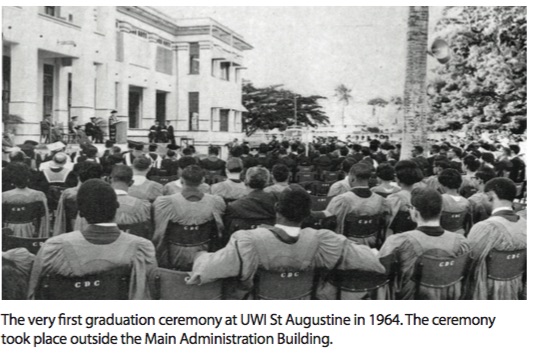
“These people were around for a long time, but became a significant force in the Colonial Caribbean in the 1930s during World War II and particularly in the immediate post-war period. One of their goals was to encourage the development of secondary and tertiary education in the Caribbean in order to help produce an educated, trained, professional cadre of people who could take each colony towards self-government and independence.”
She continued:
“The second factor is external, and it has to do with the British colonial authorities. By the time that World War II began, and above all, by the time World War II was ending, in 1944-45, I think it was abundantly clear to any far-seeing Brit that Britain would not be able to hold onto the colonial empire post war. India and Pakistan got Independence in 1947. Sri Lanka and Burma got independence in 1948. So, we’re looking at the late colonial period and particularly during the government of the Labour Party, which was in power in Britain from 1945-1951. During that period, the people who were making policy for the British colonies were anxious to leave a decent legacy. One way they realised they could do that was by encouraging and permitting the establishment of tertiary institutions in colonies that didn’t have it.”
UCWI opened its doors in October 1948 in Mona, Jamaica with a cohort of 33 medical students – 23 men, 10 women from nine countries – Antigua, Barbados, Guyana, Grenada, Jamaica, St Kitts, St Lucia, Trinidad & Tobago, and Turks & Caicos. UCWI was enrolled in an apprenticeship period with the University of London, meaning that all degrees awarded were considered “external London” degrees. Soon after the Faculty of Medicine was created, other faculties were added, including the Faculty of Natural Sciences, from which 15 students formed the first graduating class in 1953.
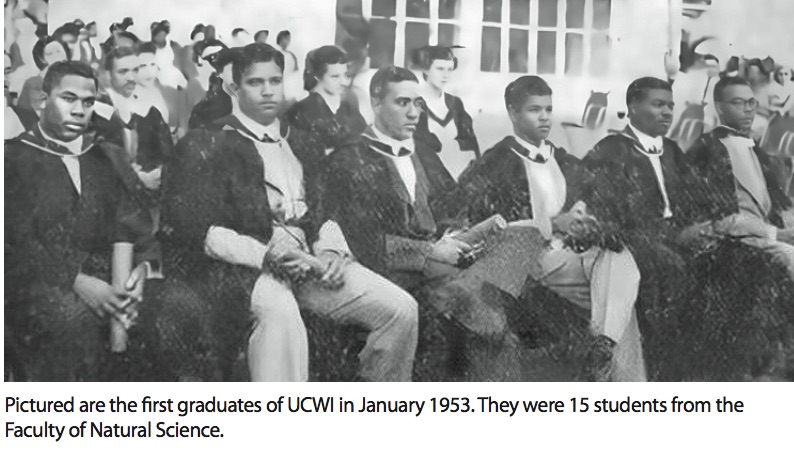
While The UWI may today boast a diverse alumni, its first students and faculty were not as wide-ranging.
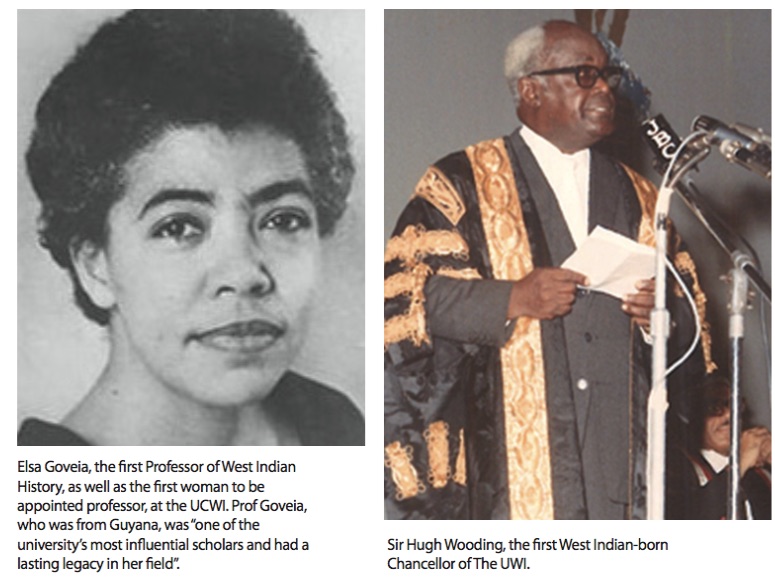
“At the beginning,” said Professor Brereton, “I think it’s fair to say that the goals of UCWI were elitist — that is they envisaged a small number of people who would get access to UCWI and who, on graduation, would become part of a new ruling class – professional people, highly educated people, who would be able to take the British Caribbean to self-government and independence. So, you could describe it as elitist, or more charitably, as an attempt to create a new meritocracy because, unlike the old elites — who got there because they were of European descent or they were wealthy, their families owned land, etc — the new meritocracy who would be trained at UCWI were there through merit.”
When UCWI became The University of the West Indies in 1962, it was an independent, fully degree-granting institution. This new configuration was the first step in the university’s progression. According to Prof Brereton, the university’s evolution has been constant, allowing for much expansion and greater access to tertiary education.
By allowing non-residential and part-time students, adding more faculties and postgraduate education, increasing the number of campuses (St Augustine in 1960 and Cave Hill in 1970), as well as implementing distance and online education, The UWI has created multiple entryways to higher education in the region. These changes were also supported by government programmes such as GATE in T&T, and the availability of bursaries, loans and scholarships.
“There has been a steady movement from 1962/1963 onwards to hugely expand the number of people who could get access to UWI to move towards a far more egalitarian and democratic kind of university,” said Prof Brereton.
With the doors of the university wide open, however, the ethos of the students and the administration did not always mesh.
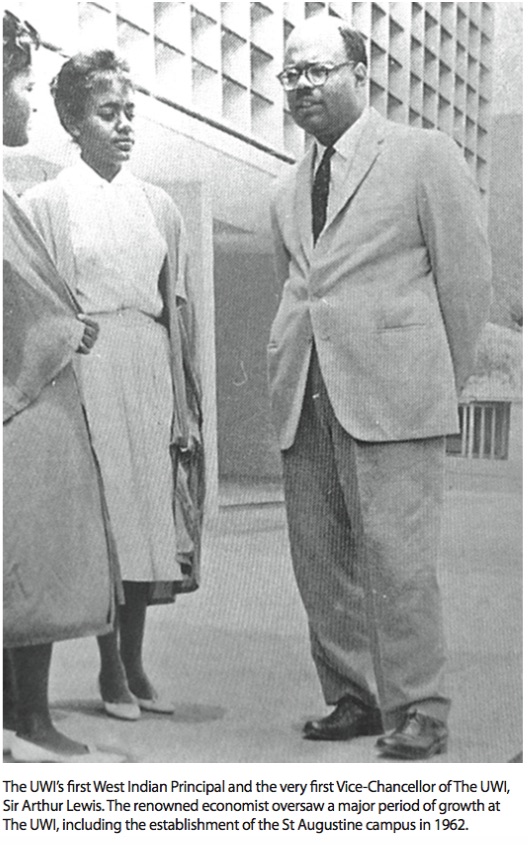
“The emergence of vibrant student movements, some political and some socio-cultural, helped to make UWI a more open and democratic university, and the converse is also true. By which I mean, it was because of the [administrative changes] in the 1960s, many more students were able to come to UWI. Of course there was a downside, and that was, in many places – certainly in Jamaica, certainly in T&T – the governments of the day were not happy to see the campuses which they helped to fund with strong movements developing which were hostile to the government,” Prof Brereton explained.
“UWI,” she said, “might find itself in trouble from time to time with the local government, but the upside was that student movements really did vitalise and invigorate campus culture and had all kinds of positive spin-offs for the university”.
When speaking of student activism, many think of the student demonstrations in support of UCWI alumni and lecturer Dr Walter Rodney in Jamaica in 1968, or the Black Power movement in Trinidad in 1970, of which many UWI students were thought leaders. However, the first documented student protests were by a group of female students from Mary Secole Hall (Mona) in 1960.
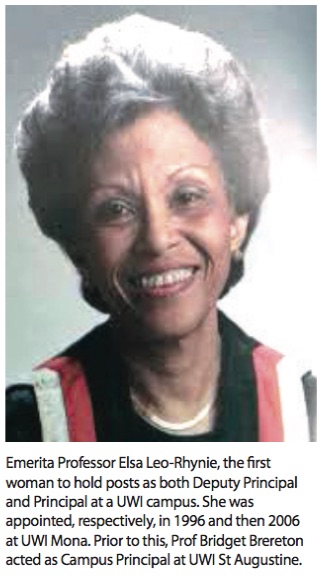
One of the early goals of the UCWI had very practical applications.
“UCWI was designed to create skilled and trained professionals who were desperately needed in the post-war Caribbean. The very first cohort was medical students, and this was no coincidence. There was a desperate shortage of medically trained people, and it was extremely expensive to send people to British universities to train. So, there was a strong practical goal in the creation of UCWI and then UWI,” noted Prof Brereton.
What did these practical goals mean for the future of The UWI? According to Prof Brereton, it has been no small feat that The UWI has developed into a top research-oriented university sustained in the Global South.
“The university has been able to create significant scholarship in many different disciplines and branches — scholarship which was not likely to have been created by Caribbean academics working abroad because they wouldn’t have had the same incentives and networks and so on. Over the decades the thousands and thousands of people graduating from UWI have provided the backbone of professional, educated, trained people without which a modern society simply cannot function. I don’t think there can be any question that the university has been central to the development of the Anglophone Caribbean over the last many decades,” she said.